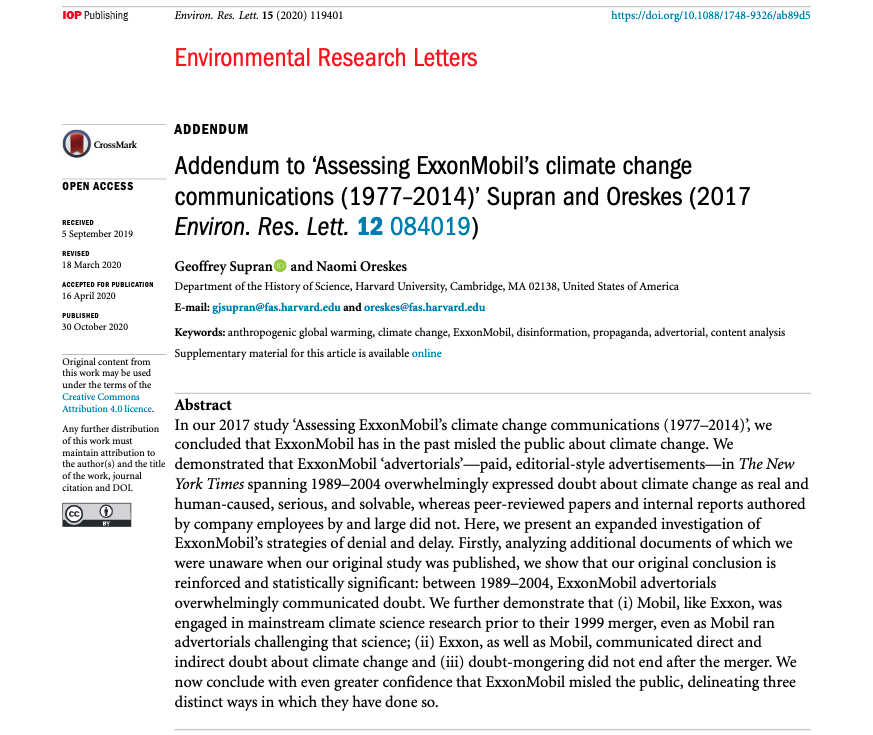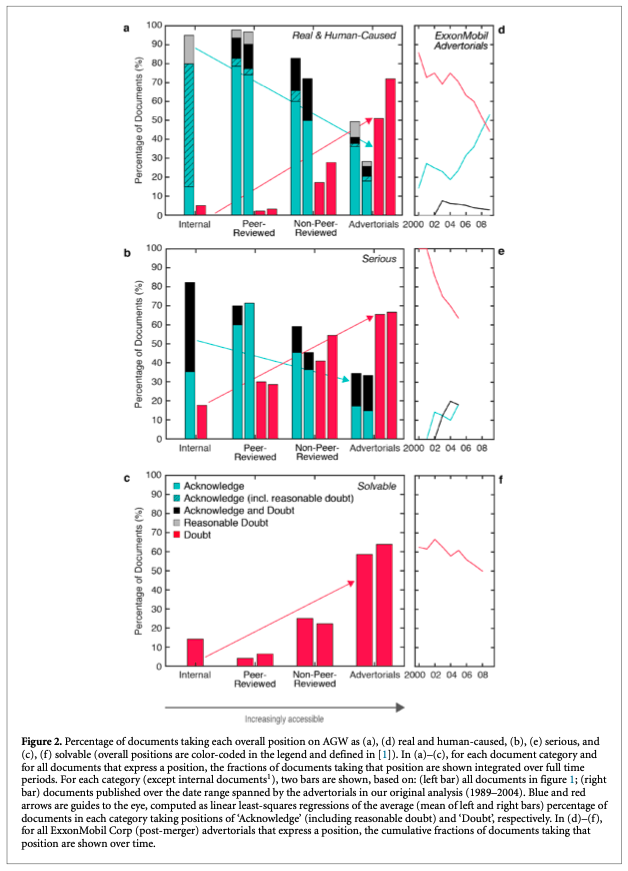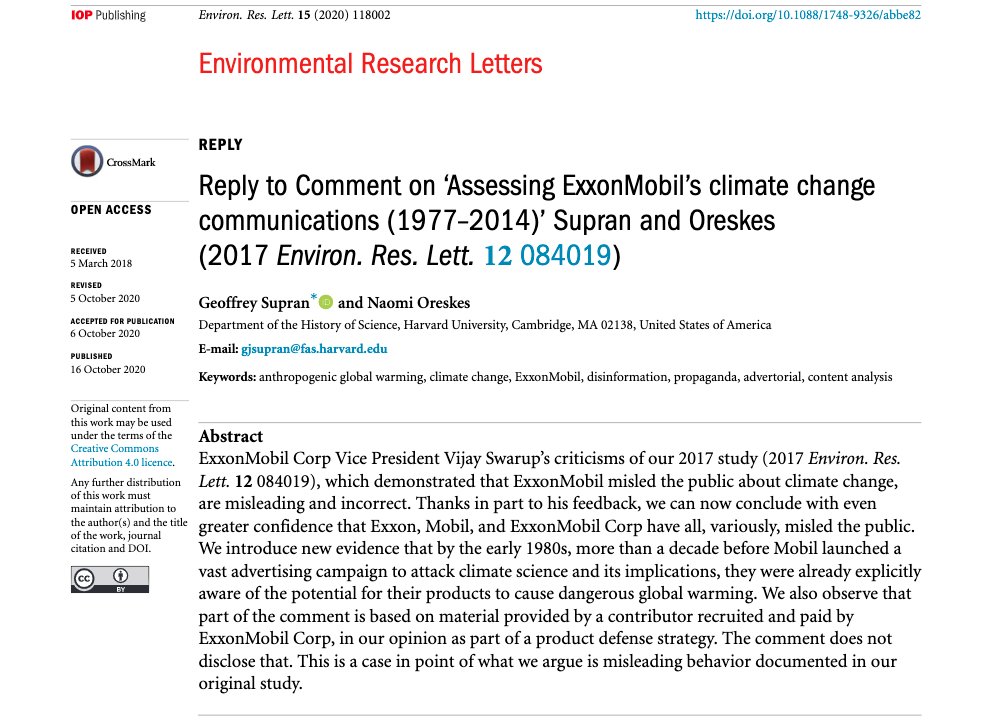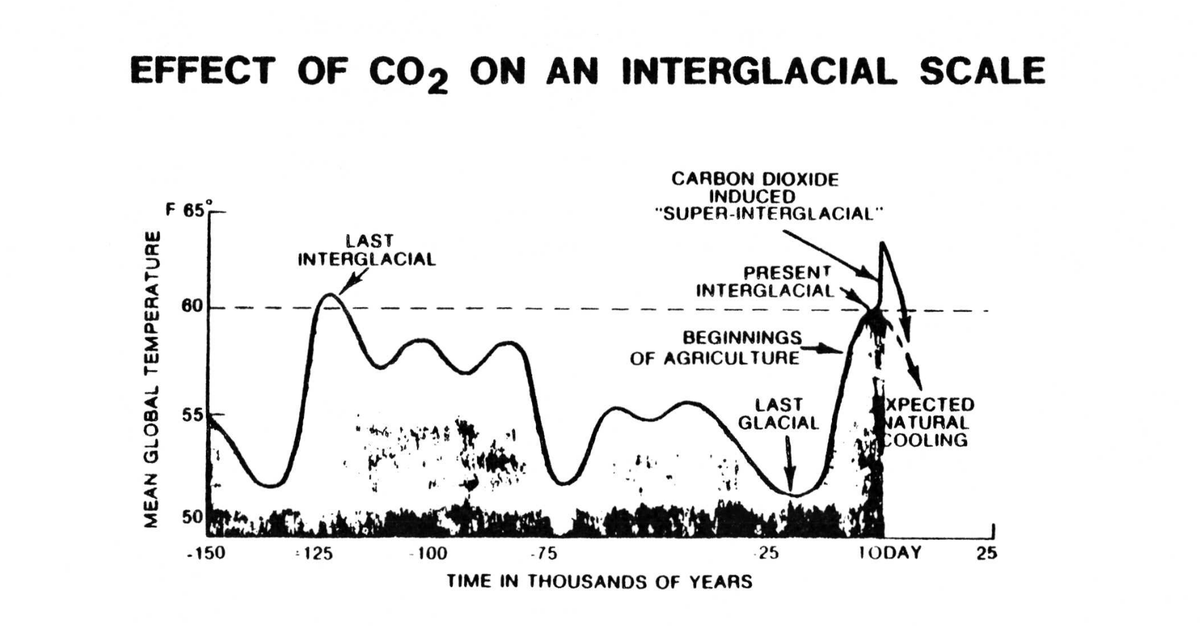
In 1966, Shell asked scientist James Lovelock "to consider the possible global consequences of air pollution from...the ever-increasing rate of combustion of fossil fuels."
It's an early example of how Big Oil studied climate, colonised academia, & invented climate denial 1/n
It's an early example of how Big Oil studied climate, colonised academia, & invented climate denial 1/n

2/n: This "prehistory of climate change denialism" is captured by @leaharonowsky's terrific essay last year, which you can read open-access here: journals.uchicago.edu/doi/10.1086/71… 

3/n: So in 1966 Lovelock, wrote a report called 'Combustion of Fossil Fuels: Large Scale Atmospheric Effects', which, as @leaharonowsky observes, "brought Shell up to speed on the latest fossil-fuel climate research".
4/n: In his report, Lovelock summarised the then-contemporary scientific consensus that fossil fuel combustion was causing both global warming and global cooling due to "the greenhouse effect" and "atmospheric turbidity", respectively.
5/n: Although Lovelock's concern that climate might on balance cool rather than warm would prove incorrect, Shell's response was foreshadowing: They insisted that Lovelock not discuss the topic "with non-Shell people".
6/n: Instead, Shell encouraged Lovelock to pursue research that would ultimately lay some of the key conceptual foundations of climate denial: a series of research projects to identify organisms whose biological activities might double as climate-regulating mechanisms.
7/n: In 1970, Lovelock proposed a project to Shell to identify biological (algae) sources of "atmospheric turbidity". This was important for determining “how far the products of the petroleum industry were contributing to the increase of turbidity and thence to climatic change.”
8/n: "In the algae blooms of the sea," describes @leaharonowsky, "Lovelock discerned proof that the planet could—and would—naturally restore itself to a climate status quo. A novel claim about the world that doubled as an ethic of corporate skepticism was quietly taking shape." 

9/n: In 1972, Lovelock gave this claim a name, the Gaia Hypothesis, and in 1975 he and Shell manager Sidney Epton began to popularise it with a cover story in @newscientist. 

10/n: "What began as a modest, Shell-sponsored study of algae biochemistry and 'natural' sources of atmospheric turbidity", says @leaharonowsky, was now becoming "a universalized environmental condition". In Gaia, human pollution was naturalised.
11/n: Shell weren't the only ones to cash in on this seed of skepticism about the nature of pollution itself.
In the mid 1970s, Dupont chemical company recruited Lovelock to appear as an expert witness in US congressional hearings on a proposed ban of chlorofluorocarbons (CFCs).
In the mid 1970s, Dupont chemical company recruited Lovelock to appear as an expert witness in US congressional hearings on a proposed ban of chlorofluorocarbons (CFCs).
12/n: But it was on climate change that the Shell-sponsored Gaia hypothesis did its most enduring damage.
As @leaharonowsky puts it, "Gaia created the conditions for a denialism that derived its power by denying the uniqueness of humans’ capacity to permanently alter the Earth."
As @leaharonowsky puts it, "Gaia created the conditions for a denialism that derived its power by denying the uniqueness of humans’ capacity to permanently alter the Earth."
13/n: For decades to follow, Gaia became a key ingredient in fossil fuel propaganda.
In Mobil's 1995 advertorial in @nytimes, for example, they downplayed environmental concerns by arguing that the planet is "one strong lady, resilient and capable of rejuvenation".

In Mobil's 1995 advertorial in @nytimes, for example, they downplayed environmental concerns by arguing that the planet is "one strong lady, resilient and capable of rejuvenation".


14/n: The Gaia story is a particularly egregious case of what @BenFranta & I term Big Oil's colonisation of academia:
Shell funds seemingly innocuous science.
⬇️
Scientific articles legitimise distracting claims.
⬇️
Claims invoked in corporate propaganda.
theguardian.com/environment/cl…
Shell funds seemingly innocuous science.
⬇️
Scientific articles legitimise distracting claims.
⬇️
Claims invoked in corporate propaganda.
theguardian.com/environment/cl…
15/n: In a twist of irony, Lovelock has in recent decades flipped from one extreme to the other. Gaia has gone from "a device for naturalising fossil fuel emissions" to "a symbol of the existential threat that global warming poses to humanity".
16/n: In other words, Gaia has gone from informing one form of climate denial & delay to another. From legitimising opposition to basic climate science; to rationalising doomist appeals to "enjoy life while you can" because "catastrophe is inevitable". theguardian.com/theguardian/20…
17/n: As @leaharonowsky concludes, "However one might want to defend Gaia...it is impossible to ignore its status equally as a corporate tool for forestalling the threat of anthropogenic change from becoming fact."
18/n: P.S. Curiously, Lovelock was ahead of his time in one seemingly unintentional form of on-point climate comms, pointing out in his 1970 book that "fossil gas" is NOT "natural gas".
For more on that see @karinlacroix @MattGoldberg100 @ecotone2 et al:
For more on that see @karinlacroix @MattGoldberg100 @ecotone2 et al:
https://twitter.com/GeoffreySupran/status/1354812714174959616?s=20

• • •
Missing some Tweet in this thread? You can try to
force a refresh









